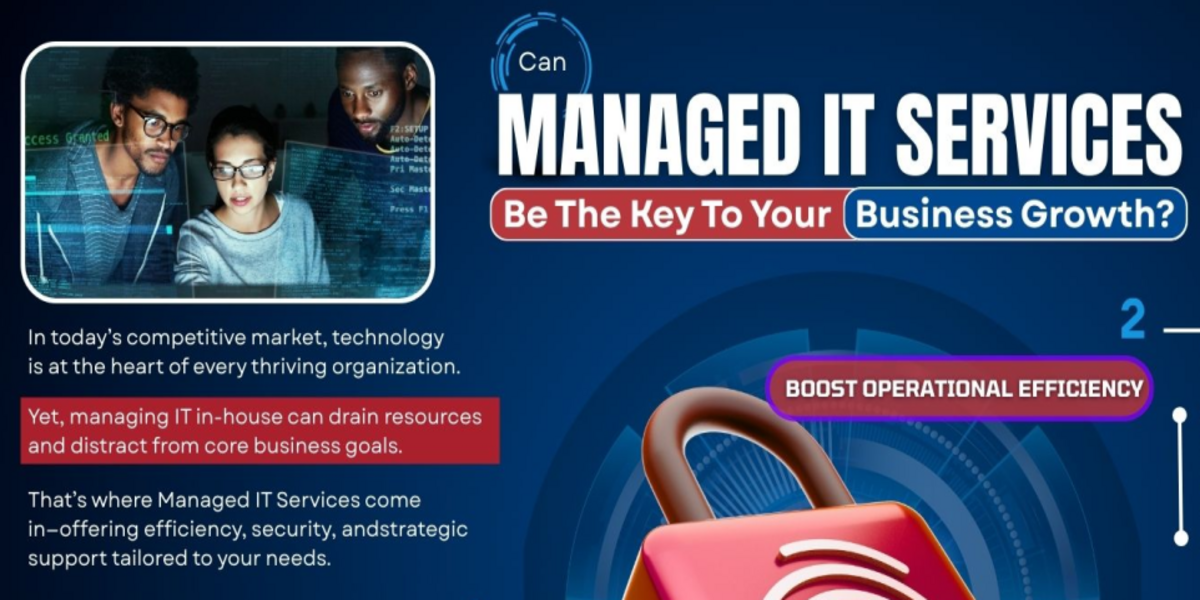Technology is the backbone of most companies today,and this especially rings true for small and medium-sized businesses (SMBs). From managing customer relationships to handling finances and every process in between, SMBs rely heavily on digital tools. But with this power comes a significant risk: cybercrime.
Cyber security threats are constantly multiplying, and 2024 is no different. These attacks are increasing in number and becoming more clever and targeted at businesses like yours. Unfortunately, SMBs often lack the extensive security resources of larger corporations, leaving them more susceptible to all sorts of cyber attacks and security breaches.
The good news? You don’t have to become a cyber security expert to protect your business.This guide will equip you with the knowledge to make informed decisions and strengthen your understanding of how cyber security services can play a vital role in protecting your business.
Let’s take a look at the top cyber security trends for 2024 and actionable strategies to help fortify your defenses, even with limited resources.
The Cyber Security Threat for SMBs
The digital world offers immense benefits for businesses of all sizes but also introduces significant security risks. Small and medium-sized businesses (SMBs) are especially susceptible to cyberattacks due to several factors:
- Target-Rich Environment: SMBs often hold valuable data like customer information and financial records, making them attractive targets for cybercriminals.
- Limited Resources: Unlike larger corporations, SMBs may lack dedicated IT security teams or the budget for advanced security solutions.
- Security Awareness Gaps: Employees at SMBs may not have received extensive cyber security training, leaving them vulnerable to social engineering attacks.
The Numbers Speak for Themselves
A recent study found that a staggering 58% of SMBs experienced downtime due to a cyberattack. These attacks can have devastating consequences, with reports suggesting that up to one-third of SMBs hit by a cyberattack are forced to close their doors permanently.
Beyond resource constraints, several common security weaknesses plague SMBs:
- Outdated Software: Failure to update software regularly leaves systems vulnerable to known exploits.
- Weak Passwords: Simple and easily guessable passwords are a major security risk.
- Insecure Wi-Fi Networks: Unprotected Wi-Fi networks allow attackers to easily access sensitive data.
Understanding these vulnerabilities is critical for SMBs to develop effective cyber security strategies.

Key Cyber Security Trends Shaping the 2024 Threatscape
Cyber security is constantly evolving, with new technologies and threats always emerging. In 2024, several key trends will significantly impact how SMBs approach their security posture.
1. The Rise of Artificial Intelligence (AI) in Security
AI is rapidly transforming cyber security. These intelligent systems are being used to:
- Automate Threat Detection: AI algorithms can analyze vast amounts of data to identify real-time suspicious activity and potential breaches.
- Enhance Response Capabilities: AI can automate routine tasks like incident response, freeing up security personnel to focus on more complex threats.
- Predict and Prevent Attacks: Advanced AI can learn from past attacks and predict future threats, allowing businesses to take proactive measures.
While AI offers significant benefits, it’s important to acknowledge potential risks:
- False Positives: AI systems can generate false alarms, leading to wasted resources and unnecessary downtime.
- Bias in Algorithmic Decisions: AI algorithms can inherit biases from the data they are trained on, potentially leading to unfair or inaccurate security decisions.
- Complexity and Reliance: Highly advanced AI systems can be complex to manage and maintain, requiring significant expertise.
2. Increased Cloud Adoption and Security Challenges
Cloud computing offers scalability and flexibility for businesses of all sizes. However, it also introduces new security concerns:
- Shared Responsibility Model: Security in the cloud environment is a shared responsibility between the cloud provider and the business using the service. Understanding this model and clearly defining roles is crucial.
- Data Security in the Cloud: Businesses need to ensure their sensitive data is encrypted and properly secured within the cloud provider’s infrastructure.
- Access Controls and Visibility: Managing access controls and maintaining visibility into cloud resources can be challenging for some SMBs.
3. The Expanding Remote Workforce and Security Concerns
The rise of remote work presents both opportunities and challenges for cyber security:
- Increased Attack Surface: With employees working from various locations and on personal devices, the attack surface for businesses expands significantly.
- Securing Mobile Devices: Businesses need to implement policies and solutions to secure mobile devices accessing company data and resources.
- Phishing and Social Engineering Risks: Remote workers may be more susceptible to phishing attacks and social engineering tactics.
To address these challenges, SMBs need to implement robust security protocols for remote access, educate employees on cyber security best practices, and consider utilizing tools specifically designed to secure mobile devices.

Major Cyber Threats Facing SMBs in 2024
While cyber security constantly changes, some threats remain persistent and require ongoing vigilance. Here are three major cyber threats SMBs should be particularly aware of in 2024:
1. Phishing Attacks: More Deceptive Than Ever
Phishing attacks remain prevalent, and cybercriminals are constantly refining their tactics. These attacks typically involve emails or messages designed to trick recipients into revealing sensitive information or clicking malicious links. Here’s what you need to know:
- Evolving Tactics: Phishing emails are becoming increasingly sophisticated, often impersonating trusted senders like colleagues, banks, or even government agencies. Be wary of emails with a sense of urgency, grammatical errors, or unexpected attachments.
- Employee Training is Key: Equipping employees with cyber security awareness training can significantly reduce the risk of falling victim to phishing attempts. Training should cover how to identify phishing emails, the dangers of clicking suspicious links, and best practices for password security.
2. Ransomware: A Crippling Threat
Ransomware is malware that encrypts a victim’s data, rendering it inaccessible. Attackers then demand a ransom payment to decrypt the data. Here’s what you need to understand:
- Devastating Impact: Ransomware attacks can cripple business operations, leading to lost productivity, financial losses, and reputational damage.
- Mitigating the Risk: Regularly backing up data securely allows you to restore it quickly in case of an attack. Additionally, implementing strong security measures like multi-factor authentication and keeping software up to date can significantly reduce the risk of infection.
3. The Growing Threat of Insecure IoT Devices
The Internet of Things (IoT) refers to the growing network of connected devices. While convenient, these devices can introduce security vulnerabilities if not properly managed. Here’s why you should be concerned:
- Unsecured Devices: Many IoT devices have weak security protocols and may be easily compromised by attackers. Once compromised, these devices can be used to launch attacks on other systems within the network.
- Strategies for Securing IoT: SMBs should only use devices from reputable vendors with a strong security track record. Additionally, it’s crucial to keep firmware updated and implement access controls to restrict unauthorized access.
By understanding these major threats and taking proactive measures, SMBs can significantly improve their cyber security posture and protect their valuable data and operations.

Building a Strong Cyber Security Defense for Your SMB
As a cyber security services provider, Microsys understands that cyber threats are ever-present, but proactive measures can significantly reduce the risk of an attack. Here are key strategies SMBs can implement to fortify their cybersecurity defenses:
1. Implement a Robust Cyber Security Framework
A cybersecurity framework provides a structured approach to managing cyber security risks. Here’s what a strong framework should include:
- Regular Risk Assessments: Regularly identify and assess vulnerabilities in your systems and processes. This helps prioritize your security efforts and address the most critical risks first.
- Comprehensive Security Policies: Establish clear policies that outline acceptable use of technology, password management protocols, and reporting procedures for suspicious activity.
- Incident Response Plan: Develop a clear plan for responding to a cyberattack, minimizing damage, and recovering quickly. This plan should outline the roles and responsibilities of different teams and communication protocols.
- User Education and Training: Regularly train employees on cyber security best practices, including phishing awareness, password hygiene, and how to identify and avoid social engineering scams.
2. Budget for Cyber Security: An Investment, Not a Cost
Cyber security should be seen as an investment in the long-term success of your business. The cost of a cyberattack can be devastating, including financial losses, operational downtime, and reputational damage. Here’s what to consider:
- Prioritize Based on Risk: Allocate your cyber security budget based on the level of risk associated with different areas of your business.
- Cost-Effective Solutions: As a managed IT services provider, we offer various security solutions, including managed security services providers (MSSPs) who offer comprehensive security packages at a predictable cost. Additionally, consider open-source security tools and free training resources.
3. Leverage Cyber Security Insurance: A Safety Net
cyber security insurance can provide financial protection in the event of a cyberattack. While it shouldn’t replace proactive security measures, it can help offset recovery costs, legal fees, and data breach notification. Here’s what you need to know:
- Benefits of Insurance: Cyber security insurance can help cover expenses associated with data breaches, including forensic investigations, credit monitoring for impacted individuals, and legal fees.
- Choosing the Right Policy: Work with an insurance broker experienced in cyber security to identify a policy that meets your specific needs and budget. Carefully review policy coverage and exclusions before making a decision.
By implementing these proactive strategies, SMBs can significantly improve their cyber security posture and reduce the risk of falling victim to cyberattacks.
Future Outlook: The Rising Tide of Cybercrime
As cyber security continues to evolve, the future brings both challenges to overcome and opportunities to seize cyber security:
- Global cybercrime damage is predicted to hit a staggering $10.5 trillion annually by 2025. This represents a significant increase from previous years, highlighting the growing cost of cyberattacks for businesses worldwide.
- On the other hand, the global market for cyber security solutions is expected to exceed $1.75 trillion cumulatively from 2021-2025. This surge in spending reflects the growing awareness of cyber security threats and the increasing demand for effective security solutions.
Specific Threats to Consider
The rise of sophisticated attacks targeting SMBs is a major concern. These attacks will leverage advanced techniques such as:
- Artificial intelligence (AI): Attackers may use AI to automate attacks, making them more difficult to detect and prevent.
- Ransomware: Ransomware attacks are expected to become even more prevalent, with global damages predicted to exceed $265 billion by 2031.
- The explosion of data: By 2025, the world will need to cyber-protect an estimated 200 zettabytes of data. This massive volume of data creates new security challenges for businesses of all sizes.
Cyber security is continuously evolving, making it crucial for SMBs to stay updated and adapt their defenses accordingly. By staying informed about new security risks and ensuring all employees are aware, SMBs can significantly improve their readiness to respond to an attack.

Don’t Be a Statistic: Take Action and Secure Your Business Today!
Cybercrime is booming, and so are the tools and strategies available to combat it. At Microsys, we fully understand the unique challenges faced by SMBs in today’s constantly changing environment. As a managed IT services provider in Stouffville, Markham, Aurora, and beyond,we offer comprehensive cyber security solutions designed to protect your business across all fronts.
We provide comprehensive cyber security services, including Managed Security Services (MSSP) for 24/7 monitoring and response, endpoint protection against cyber threats, and security awareness training to empower your staff. Our network security solutions further safeguard your infrastructure from unauthorized access.
Don’t wait for a cyberattack to cripple your business. Contact Microsys today and take a proactive approach to cyber security. As a leading cyber security services provider with multiple decades of experience in the industry, our team is constantly attuned to the latest cyber threats and is ready to advise you on the best strategies to protect your business.
Invest in your cyber security today and secure a brighter, more protected future for your business!



